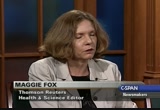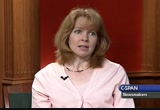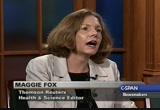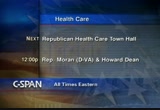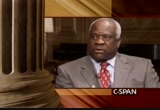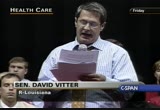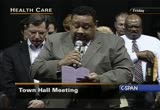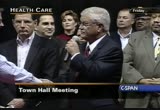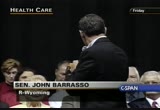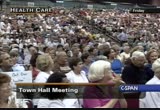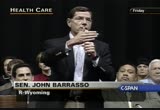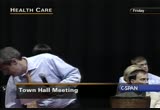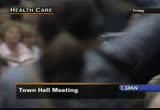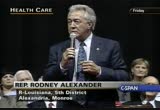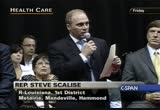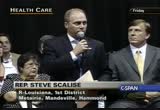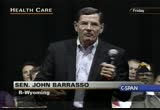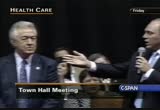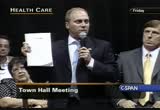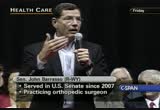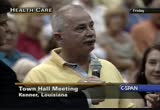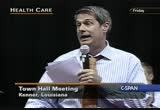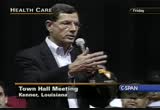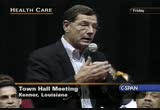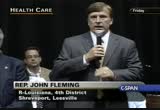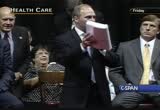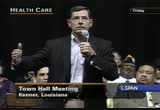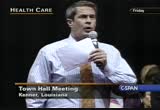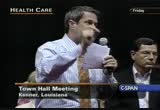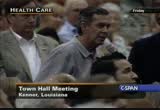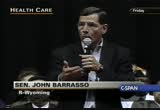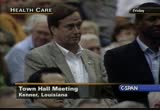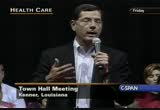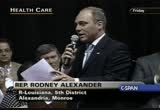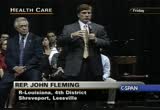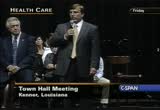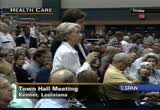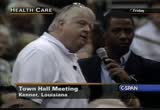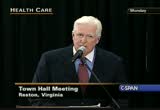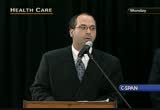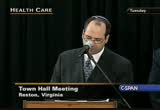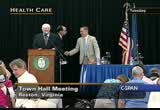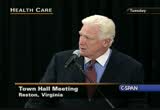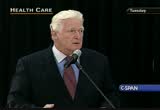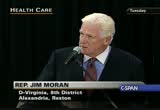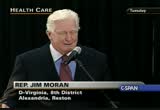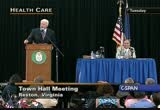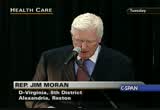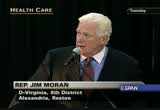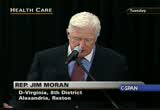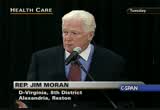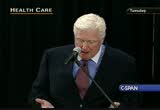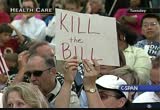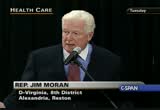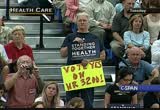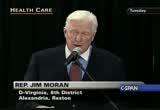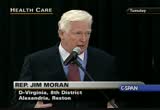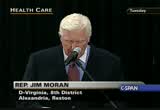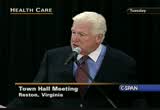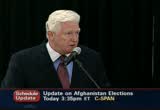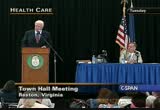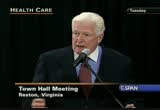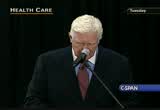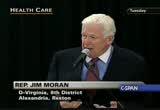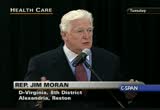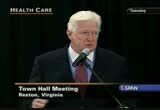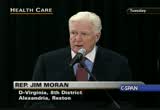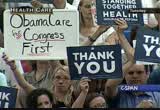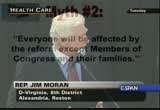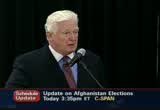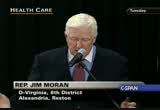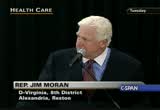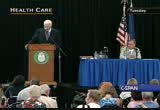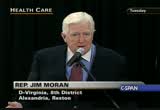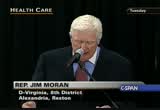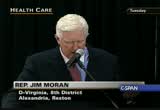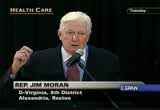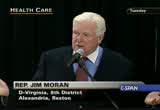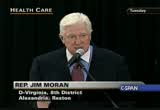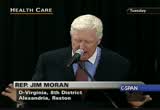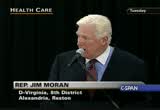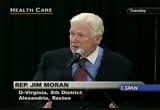tv C-SPAN Weekend CSPAN August 30, 2009 10:30am-1:00pm EDT
10:30 am
quickly as it has. the number and proportion of americans who are obese has doubled in just a couple of decades. that's not because our genes have changed. they haven't. that's not because our tastes have changed. they haven't. we're hard wired to like sweet salty foods. it's because our environment has changed. there's more on healthy food around. it's more accessible, it's cheaper. there's less healthy food around. it's harder to get to. it's more expensive. until we change that environment. we're not going to tip the scales on the obesity epidemic that we're living through. and not only does obesity cause lots of health problems but it is driving to a large extent the increase in health care costs in this country. >> dr. frieden, we are out of time but want to thank you for being on nake. >> "newsmakers." >> thank you very much. >> we have a few minutes left. but lets start with swine flu. what did you learn from what he
10:31 am
said and compared to what the president's team also said about it? >> it's very interesting. the c.d.c. in the past couple of days, and dr. frieden just now, have distanced themselves from some of the press coverage of what came out of the report. the report itself was a fairly balanced report written by skinettists who aren't usually involved with the exception of dr. harold varmist who used to he had the n.i.h. and was on the panel who report wrote the report. people tend to jump on scary numbers and that became a huge issue and some of us who have been writing were somewhat surprised at the play that got and dr. frieden reflected that. that really is a bit exaggerated. we have known that flu can cause a huge number of deaths very quickly if it takes off. this flu doesn't look like it's going to do that so far. and the preparations have been based on a worst scace case
10:32 am
squen air yow. and we reflected that opinion. and he showed a balancing act the health officials are facing. you want people to sit up and pay attention, to be concerned, concerned enough that if their child sows symptoms they don't send them to school and go off to work like usually we all do. but they also don't want people too panic. so that's going to be a fine line. >> what about saction sin availability? >> he was not very optimistic that it was going to be much earlier than mid october and that's what a lot of the concern is. kids are already back in school. there are already some schools that are experiencing clusters of illnesses, so the question is how rapidly it will start. usually it doesn't start until late october, early november. >> he also mentioned that $1 billion has been invested trying to come up with vaccine. and yet we still have concerns about availability. >> it's a really slow process. we rely on 40-year-old technology to make flu
10:33 am
vaccines. there are companies trying to come up with quicker ways, but the testing and licensing process is very slow. there was an incident with swine flu in 1976 when a whole lot of people were vack nated. surveillance showed a lot of side effects. it's not clear they were caused by vaccine, but it caused a great deal of doubt. people don't like gets shots and they'll look for any excuse not to. and people glommed on to the idea that this was dangerous. a lot of companies got out of the business of making vaccines. and not much was invested with making it better. and they're stuck with that. they have nothing to do with the process of making them but now we're facing what could be a crisis and we're paying the price for our slow investment in that kind of technology. >> final thoughts. >> stay tuned. we have clinical trials that are under way right now that are going to answer the number one question. do you get one shot or do you get two shots? and if you need two, how do you
10:34 am
make sure you line up and get both of them? lauren and maggie, thanks for being on "newsmakers." >> next, our coverage of recent health care town halls continues in kener, louisiana. with republican congressmen john fleming and john bar aso. and then republican representative john moran and howard dean. in virginia. >> monday on washington journal, a discussion on recent health care town hall meetings with virginia congressman gerald connelly. we'll have more on health care as we hear from the president
10:35 am
and c.e.o. james coal and dr. john garrett. also a discussion on recoovery efforts in louisiana four years after hurricane katrina with paul rainwater. washington journal live at 7:00 a.m. here on c-span. go inside the supreme court to see the public places and those rarely seen spaces. hear directly from the justices as they provide their insight about the court and the building. the supreme court, home to america's highest court. the first sunday in october on c-span. >> congressman john fleming and senator john brasso of wyoming, boats physicians, join john vitter. this lasts about an hour, 25 minutes. [applause]
10:36 am
>> thank you all for being here. well, good afternoon and welcome to our health care reform forum. you know, nancy pelosi may consider you an un-american mob, but i'm delighted to see you here, each and every one of you. the more, the better. i'm also delighted to be joined by four other members of congress. one of my colleagues from the senate and three of our u.s. house members representing different parts of louisiana. so let me introduce them at this time. first of all, john brasso of wyoming was elected in to u.s. senate in 2008 after having been appointed to fill a
10:37 am
vacancy in 2007. john is known by many as wyoming's doctor. during 24 yures as an orts pete i can surgeon, he served as president of the wyoming medical society and named physician of the year. he also served as medical director of the wyoming health fairs bringing low cost screening exams to people all around the cow boy state. and he also represented natrone county in the wyoming state senate for five years. please welcome senator john brasso. [applause] . next, we're delighted to have
10:38 am
congressman rodney alexander, representing louisiana's fifth congressional district. prior to being elected to congress, rodney was chairman of the house health and welfare committee in the louisiana legislature. and in this position, rodney shepherded through the louisiana children's health insurance program, which was a republican initiative initially. although he believes there are areas where we can and should improve our health care system, rodney opposes the current house health care bill because it sets the tone in washington for a government takeover of the health care system. welcome, rodney alexander. [applause] >> congressman steve sca lease represents louisiana's first congressional district, representing so many of you.
10:39 am
and of course before being elected to congress steve served 12 years in the louisiana legislature. steve is a member of the house energy and commerce committee. which has jurisdiction over the largest part of health care legislation. and he has taken the position that individuals and their physicians should be in charge of their health care decisions, not government bureaucrats. steve scaliss. [applause] . and last but certainly not least, dr. fleming.
10:40 am
he has spent his career as a family physician. in fact, he was named louisiana family doctor of the year in 2007. and john and i have both introduced legislation requiring that all members of the u.s. house and all members of the u.s. senate are put in any government option that may be passed. welcome, dr. john fleming. [cheers and applause] now, why don't we all get started in the right frame of mind and the right frame of heart by standing up, again, if you can, for a prayer. and please remain standing immediately following the prayer. we'll have the pledge of
10:41 am
allegiance to the flag. but first, we'll be led in prayer by reverend al carter. reverend. >> heads bowed and eyes closed. father, forgive us for our sins of commission and owe mission. give us the strength to release any jealousy, envy, hatred, strife, and help us to forgive one another. for we know you will not forgive us unless we forgive others. we pray for your presence today as we discuss vitingle issues that will impact all americans. we know that your work there is the heart of the king is in the hand of the lord and you turn it whichever way you will. we pray that this discourse will be healthy, informative, encouraging. let us remember while you have given the instruments of healing to man, the healing of
10:42 am
man is still in your hands. we pray for all that are here today, the families and their communities. we pray that where there's sickness, let there be healing. where there's poverty, let there be prosperity. where there is ignorance, let there be knowledge, where there is violence let there be peace. blessing for all of our national and local leaders, as well as special blessings for our president, and for all of our senators, congressmen, officials and clergy present. we pray for the protection of unborn children as well as for our elderly. we also pray for the peace of jerusalem, for your words they that pray shall prosper that love three. and finally, ask your blessings upon the state of louisiana, the united states of america, and pray that we will remain one nation under glodind visible with liberty and justice for all. all these blessings we ask in
10:43 am
the name above all other names, the name by which every knee shall bow, the name of our lord and savior, jesus christ. >> thank you, reverend. and now we'll be led in the pledge of allegiance to the flag by our host here in the center, mayor of kener. ed. >> thank you for coming. and thanks for all the good things you've done for us. join me please in the pledge. i pledge allegiance to the flag of the united states of america. and to the republic for which it stands. one nation under god. indivevissible with liberty and justice for all. [cheers and applause] >> thank you, mayor. and again thank you for all of your help in hosting us here in the center.
10:44 am
and also, i want to thank police chief steve carea way who has been enormously helpful. and the entire city of ken anywhere. this is how the program is going to work. we're going to have some very brief introductry comments from senator dr. brasso since he is our guest and he has been working specifically with the only other m.d. in the u.s. senate, tom coburn, prying to splay the health care bill before the senate and alternatives to it. so john is going to get up and give some of is overview and thoughts, and then we'll go directly to the heart of the program which are your comments and your questions and your concerns. if you haven't already, please use one of these simple pieces of paper we're handing out to jot down your name and your comment or question. and please pass it to staff. and then we're going to go
10:45 am
through absolutely as many comments and questions as possible. i'm going to announce a few people ahead so that when your name is called, if you can move to the mike here in the aisle and you'll be ready for our conversations, because we certainly want follow-up conversation. so with that, let's get started. and again, welcome dr. john brasso. >> thank you. thank you. tonight thank all of you for being here and joining me along with senator vitter who truly is a great american. we went to afghanistan to visit the troops last easter, and it's a privilege for know serve with him in the united states senate. and we have such a respect for our military. i would like just before we start if it's all right if we would ask all of those who are here with us today who have served our nation to please stand and let us thank you.
10:46 am
[applause] i've had a chance as one of only two physicians who serve in the senate to talk about the issues that we're trying to face. and as the reverend said, these are vital issues, these are personal issues. these are issues that affect all of us. health care is such a personal thing. it's going to affect, no matter what they do legislatively, it's going to affect every person in this room, every person in america. it is one-sixth of our economy and it is something that we all must take very, very seriously. and i can tell you, ladies and gentlemen, we do. i walked out here with this big briefcase because i wanted to show you some of the bills.
10:47 am
people say have you read the bill. this is house bill 3200. i held this up at a town hall meeting in wyoming on monday night, and somebody in the front row yelled, burn it. [applause] and then they say what about the senate bill? this is just part of it. the paper clip was only big -- this is the health committee bill in the senate. there's more. one minute. and then i held this up, and
10:48 am
they said, start a bon fire. and tom coburn and i have been traveling the country with our senate doctor show. we were in nebraska, we were in northern mississippi. we were in northwest arkansas. and we have been getting crowds like this of people that are saying this is not what we want. there is a metropolitan of the house of representatives from michigan and they asked him, are you going to read the bill? and he said read the bill? it would take two days and then two lawyers to explain it to you. if it takes two days and two lawyers to explain it to any of us, we should not be passing such a bill and nobody should vote for that kind of a bill. [cheers and applause] i don't know how many of you ever watch fox news on
10:49 am
television. i had the opportunity to be on there this morning with megan kelly on the morning show. and we're talking about these bills. and i'll tell you, we are at a time when our nation is spending too much money, borrowing too much money, and there are too many government takeovers, and we have to stop it. [cheers and applause] now, there are folks who believe, and nancy pelosi is one of them, she actually believes -- [booing] she actually believes that the fact that all of these folks are showing up is contriveed and there are people paying you to be here. people are here because they are here for the right reason, because we're trying to protect our freedoms.
10:50 am
[cheers and applause] well, i could go on and on, but david has a whole list of questions that are your questions, so it's better for us to hear from you than you to hear from us. thank you for letting me be here today with my friend david vitter. thank you. >> thanks, john. ok, let's get to the heart of the program. your comments and concerns and questions. our first comes from mary cass. mary, if you could find your way to the floor. and let me mention the next three up in the lineup. charlotte felt, lanie and donald preston. if you could start making your way to the floor. but mary cass asked, how can you give health care to all without financially destroying the nation? john, you want to take a crack at that? >> well, and we have another
10:51 am
physician here. we have other members of the house. if they want to jump in as well. it's the excellent question of how do you do wit all of this money? especially in these economic times. and you say is there enough money in the system? well, you can debate whether there is or not. we're spending of one-sixth of all the money. and we know that medicare, the system who helps seniors and friends, helps them. but we know there's more waste fraud and abuse in that program than any other government program. there is money that can be dealt with because right now drug dealers in florida are getting out of drug dealing and moving into medicare fraud because number one it's more profitable, number two, less chance of getting caught. number three, if you get caught the punishment is less. so there are things we can do to improve the system. but what the president is trying to do is expand coverage, as he said on tv, to 47 million million americans. 11 million of these people
10:52 am
aren't americans to begin with. many have come here illegally. [cheers and applause] we can do more with prevention. and we can get into a discussion of all of these things. but david wrks these economic times to say when the president says i want to do it without increasing expenses but then the price tag on the one bill is $1 trillion, and the bill that i brought out in four pages it's not bound together yet into like the telephone book kind of version, and the reason they haven't done that even though it passed along partisan lines with all the democrats voting for it in the health committee and all the republicans voting against it, they haven't bound it together because once they do that then everybody can get to read it on the internet. they don't want you to see what's all in it. plus, they don't want to put the price tag on it because it's going to be much more expensive than the house bill. so what i'm seeing is a trojan horse that we're not going to be able to do it in the way the president promises.
10:53 am
he promises one thing, then there's another thing when you actually read the pages of the bill. to me there is a gap between the president's rhetoric and the reality of what's printed in the pages. and the pages are what i'm opposed to. [applause] >> you all want to comment on costs. >> in the senator pointed out important points of the bill. the bill actually, according to the congressional budget office. and you don't need to listen to what one member of congress on one side or another side says. the impartial office estimates that h.r. 3200, the bill you held up that many people fortunately are reading will have $239 billion in increased national debt. in addition to $800 billion in new taxes that's in that bill. so their bill that they filed has $800 billion in new taxes. and even then it's $239 billion
10:54 am
out of balance still. >> do you have any followup? >> thank you. everybody. i had a comment. you answered the question. but those numbers are so like over our heads, it's just -- and i just want to say, for the sake of my family's future, i cannot afford to be blind any more. and i do believe there are panels in the health care bill. but i believe the death panel is congress and they're promoting america's suicide. [cheers and applause] the most powerful weapons against america, are not guns, missiles, terrorists, but ignorance, complacency, and disdain of our history and guidance principles. we are close to losing our liberties. we are patriotic but almost forgotten why. and we're becoming more like puppet patriots. but we have this moment in history to stop suicide.
10:55 am
i have this moment to tell you, david, congress and president obama you all were never given the right to destroy enslave or impoverish this great nation. thank you. >> thank you very much. [cheers and applause] charlotte felt. will the senate be covered by the same law that they enact for us? i find it reprehensible that a house committee rejected that amendment that said just that. well, charlotte, you're just right. you're very right about that. as i mentioned, dr. fleming and i have both authored that provision. and on the senate side, that's going to be my first amendment on the senate floor. if there's any government option in the bill, if there's anything like that, then every house member, every senator, all their immediate family have
10:56 am
to be in that government option. no other choices. [cheers and applause] no special attending physician at the capitol, no special privileges at military hospitals. nothing else. the government option. [applause] charlotte, do you have anything else to add? >> no. that's all i wanted to hear. thank you. >> john has authored the same thing on the house side. >> thank you, david. i set forth house resolution 615, which some of you may be aware of. it simply says that if you vote for a government run health care system you in congress are willing to forego the waiver that's in this bill and you will sign up for yourself. as david points out, he has
10:57 am
authored the senate version. to date we have over half million americans who have signed a petition to encourage their representative in washington to do the same. now, we have 73 congressman, including the gentleman behind me here, who are also co-authors. and i have reached out to every single democrat in the house, including nancy pelosi, and not yet one has been willing to sign up for it. >> i would like to say, again, i'm rodney alexander, i represent the fifth congressional district. that's the district that lies to the north of baton rouge, all the way to the arkansas line. i too am a co-sponsor of dr. fleming's legislation. but i personally believe that if any of these bills lying on the floor pass, that it really won't be relevant anyway because i think we'll all be under one plan. i think that's the motive is to put everybody under one plan.
10:58 am
now, i think it's even more misleading to have leaders, especially the president during his campaign, he often said i want to make sure that everyone has access to the same type quality health care that members of congress have access to. well, i want to tell you, for my wife and i have been married 42 years. my wife is a school teacher for over 30 years i have been a member of the louisiana state group benefits health plan. still am today. so i don't have access to any more quality health care than the spouse of any other school teacher or state employee in the state of louisiana. the employees that we have have to pick and choose from a cafeteria of plans. some of the employee that is i have are covered by blue cross/blue shield. if i got off of the group
10:59 am
benefits plan, i would probably have to sign up on blue cross/blue shield. but we have to pay for the insurance that we have. so we don't have this pie in the sky plan that many lead you to believe that we have. >> and charlotte also, you're exactly right that this very amendment you were talking about was proposed in house committee. the problem is the proponents of the bill defeated that amendment, killed that amendment including charlie from louisiana voting against that amendment. [booing] . lanie. where is lanni. what are you doing to defeat this bill and can reconciliation succeed if they try that? one thing dr. brasso is doing is joining with the only other physician in the u.s. senate, dr. tom coburn of oklahoma. and they have a doctor show and they're doing an enormous
11:00 am
amount of outreach about this issue because of their medical background, which is doing a lot to educate people and get folks involved. and john, maybe you can talk about reconciliation, what that is. >> ladies and gentlemen, i'll tell you, very few people in the united states senate know the rules better than david vitter or know how to use them effectively. i've not been through a reconciliation fight. but what i'm trying to do is visit with people all across america. at the time of the revolution, benjamin franklin said, a third of the people weretories, they favored what the british were doing. and a third were true blue. and that's all you here in the audience. . .
11:01 am
>> it seems like we are losing the war in the media. what can we do to solve that problem? >> i understand your concern. i don't care how the media covers it, in august, we have been winning the war and we can go on and win the war if we keep at it. [applause] the big question is, are we going to keep at it ase active, involved citizens? will week's debacle, passionate? are we going to keep in everybody's faces and every
11:02 am
member of congress in august and september, october, and november, however long it takes? [applause] we go to donald preston, let me give you the list of the order. if you could start making your way to the isle. first, donald preston -- president barack obama said at a town meeting that the medicare advantage plans don't work. i have had people's choice 65 for years and it works for me. no charge for operations including hospital stay and doctors is an example. i agree with you. that is why i am opposed to putting that out. one of the specific proposals from the proponents of this bill, in terms of how to pay for
11:03 am
it, is a $500 billion cut to medicare. that is half a trillion dollars. medicare advantage is at the top of that hit list and the top of that cut list. please know that. >> the president had town meetings in montana, north of wyoming, and then in colorado, south of wyoming and said that if you have a program you like, you can keep and in the same speech, he said we would eliminate medicare advantage which is to 10 million american citizens. i am sure there are people like you today -- we really have 3000 in wyoming -- when they put the program in place, it was intended for people in cities and people in rural communities. that is louisiana. i had the privilege to tour the newly opened new orleans state medical university medical area. it is stated the art.
11:04 am
doctors around the world will come their to learn things about computer simulations surgery. i am an orthopedic surgeon. it is beautiful what they have therefore cardiologists and for general surgeons and four medical students, four nurses, positions, it is absolutely incredible. they also have a program to help train physicians to practice in rural louisiana, to help them go through a program with help for their tuition so they will stay after they've graduate to be pediatricians, obstetricians, primary-care doctors that we need in this country. i think medicare advantages very important. i also had the privilege to look at the community health center that to lay in as. -- tulane has. it is a labor of love.
11:05 am
it helps your community. with tomorrow being the fourth anniversary of the tragedy of hurricane katrina, to see what these people have done and how to start with a tent after the hurricane and now they will move into a former state house with a new clinic which is designed to help people in the community. this is a community where people held about one another. the community should be brought of this and you do it right. it is remarkable getting back to medicare advantage -- it means a lot to 10 million people. for the president to say it will be eliminated, that is not good. i take care of a lot people as a surgeon. for people on medicare advantage, lower out-of-pocket costs, it helps coordinate your care, it helps with preventive care, medicare does not do a good job of that -- medicare
11:06 am
damage as a better job. can it be improved? sure. to eliminate it, i think is a mistake. [applause] >> do we have a follow-up? >> i completely agree. thank you for listening to us. i appreciate it. >> jean rice -- explain the vote in house committee. steve scalisse it was there. maybe he will explain. >> in the commerce committee, we have many amendments. i co-sponsored a number of them. i was a co-sponsor of the amendment that would have forced a member of, -- congress to join the plan. i think it is a bed bill but i think that put your money where your mouth is. they also voted against that.
11:07 am
we had an amendment on abortion. there was one bill to amend abortion in the bill. the national right to life -- there is a lot of dispute whether abortion is in the bill. do not believe any politician in washington. the national right to life says they expressed their opposition to h.r. 3200. this bill would predictably result in the greatest expansion of abortion since roe vs. wade. because of the amendment in the bill, we turned around and we brought up an amendment to ban abortion in the bel predr we passed it on a very close vote for it unfortunately, they turn around later, you can watch the tape on c-span, henry waxman brought it back up again and
11:08 am
defeated an amendment, using a procedural trick. it allowed them to bring it up again and killed our amendment that bans abortion in the bill so that it reverted back to the original form. according to the national right to life, that would result in the greatest expansion of abortions since roe vs. wade. we forced a vote. we would be happy to get two copies of them. they occurred and they defeated our amendment. they allowed abortion in the bill. >> do you have a follow-up? >> yes, i do. i would like to mention that i am very disappointed that the people in south louisiana cool are some of our most flavorful and well respected people are blinded by the liberal views. the good old boy is not only is -- does not always work.
11:09 am
[applause] >> jaon ifgram-- where is the republican health care plan? why is it not publicize? democrats say that republicans say no. do republicans have a plan? >> we have about five different plans. the position, tom coburn, often talks about his plan. go to our website and watch the show twice a week. it is at www.repu blican.gov/doctors. there are different opportunities to the different plants which are much less expensive and provide more coverage and deal with the pre- existing conditions that people have. they are designed to have people who buy their own health insurance have the same
11:10 am
opportunities to take texted and as for the big companies. these have been written about but not recovered in the press. yesterday, as we were doing the senate doctor show, we had an interview with cnn and dr. golden was asked about why republicans don't have a plan. he went on about the different republican options. the reason we are not getting the press on it -- [no audio] [inaudible] >> you will be happy to know that cspan is behind you and they will play this weekend. the guy who waved his hand from cspan. [applause] here he is. ">> joan, do you have any
11:11 am
follow-up? >> yes, i want to thank you. i think you are one of the most maligned senators in washington but you always stand up for yourself and stand up for us. i appreciate that so much and so do all of us. [applause] >> as we go to barbara bailey, i >> the question that joan had was important. there are few house bills and senate bills that are competing proposals. h.r. 3200 is the bill that passed the house committee that i opposed. in the house, there are a two other bills, including one, h.r. 3400, which is a bill we put on our website. we have 20 co-sponsors.
11:12 am
we have more co-sponsors on our bill than the democrats have. h.r. 3200 only has seven co- sponsors yet there are 20 members of congress, including four medical doctors. they join together so small groups of people can get the same buying power as big companies. we have medical liability reform which they don't even talk about. [applause] estimates are that you could save $100 billion per year by doing common sense medical liability reform and address pre-existing conditions. we give you the ability to buy insurance at a lower price without the government getting involved in without $800 billion in taxes. >> right. [applause] as we go to barbara, i want to ask the following folks to start making your way to the isle. dr. sistrunk,cecil bailey.
11:13 am
will you vote no on the health care plan and captain trade? my response is, it did go and did go, absolutely. ditto. [applause] these house members have already voted no on cap and trade. i think everyone on the stage agrees on both those issues. [applause] do you have a follow-up? >> i sit next to him on the environment and public works committee. when barbara boxer glares back to our side of the table, i am not sure whether she is clearing at him or me. we will continue to fight against this program that will cripple our economy and a cripple our energy and make us more dependent on foreign sources of energy and undermine our national security.
11:14 am
thank you. [applause] >> that's all i wanted to know. >> all right. you understand, we each want to be the cause of the glare. we argue about that. dr. royce sistrunk -- is there any hope for tort reform in this congress? [applause] i will give you my gut, honest answer -- in this congress, i think the answer is no. i don't think this congress will ever consider meaningful tort reform. let me remind you of the purse rule of politics which i think is relevant, particularly as we think about the next election -- in politics, it is a lot easier to change bodies then to change hearts and minds. keep that in mind.
11:15 am
[applause] >> let me extent that, as well. you heard howard dean a couple of days ago in a very candid moments that," the reason why we cannot put it in the bill is because it will never passed because of our trial lawyer constituents." >> give him an a for honesty. >> who is more important? the special interest trial lawyers or the american people? i think you know what the answer is on that. [applause] >> it is fascinating to me because somebody who has practiced medicine for 25 years, my wife is a breast cancer survivor, she has been through three operations and the whole thing perry we have seen it from both sides. practicing medicine, i will tell you that absolutely every
11:16 am
physician, if you ask them if the order a test that costs a patient money but did not help them get better. every doctor will say they have done it. but costs all of us a lot of money. i see stormy johnson, the past president of the american metal pole association. program -- medical association. president barack obama kept it out of the bills. it is wrong. when they passed toward reform in texas, the rates went way down, all lot of physicians went there to practice. they found that the number of these tests that were done, the
11:17 am
defensive medicine, went way down. it is predicted about $200 billion per year is spent in defense of madison that does not help anybody. if a kid gets hit on the head of in baseball and you take into the hospital to check the kid out, when i was going to medical training, responsible parents get a sheet of paper to take home to wake them up and make sure their eyes are focusing. you cannot do that anymore. every one of those young people will now get a cat scan or mri to make sure there is not some bleeding going on so they are not the one in the million that is the case that results in a lawsuit. there is not only the financial cost but there is also all of these kids getting radiation. we don't want that to continue to build up. we absolutely need to do something about this. the other thing is that about
11:18 am
60% of all the money in the system does not ever get to the injured person. if there is an injury, the person ought to get something to help them for what their losses. 60% of the money goes to the system. that could be lawyers and export witnesses and it takes too long. and it takes years. you want to find a better way to make sure someone who is injured is helped and the money actually gets to a person who was injured in a timely way. this congress doesn't seem to have that interest. we know this is critical and is something that could help drive down the cost of health care for all americans. >> absolutely, doctor, do you have a follow-up? no? allan ross, the retired u.s. marine who served as country for 20 years at a reduced rate. [applause]
11:19 am
he served his country at a reduced rate to earn retirement and health benefits. what about that verses getting this stuff away to non- productive people? do you want to elaborate? [inaudible] >> the pay is not the greatest. i was in 1975-1995. the two benefits that to look forward to is military pay after 20 years you can get out into something else but also, you have health and medical benefits for life. those are the two big things. i can see that that will be given away. an ordinary person who sat on the couch will get the same benefits i have burned.
11:20 am
-- i have earned. what will you do to the hundreds of thousands of retirees who are in the same boat as me? what does the military have to look forward to. there should be some kind of compensation per request i hear you and i can tell you that if the obama plan passes and the estimated cost -- an estimated cost of $2.40 trillion over 10 years, with deficits and debt that are already skyrocketing, in terms of the federal government, you don't think that will squeeze everything else in the budget including what we have for our soldiers and military retirees? of course it will. of course it will squeeze all that. any follow-up? >> i understand it. >> thank you for your service.
11:21 am
[applause] john fleming was a military doctor. you saw that firsthand. >> yes, i just visited with the va in shreveport. this very issue came up and how it would impact the va and active-duty military and their families. as far as i'm concerned, no one deserves the best this country can give them those who wear the uniform of the united states of america. [applause] why should we give free health care for people who do not belong in this country and deprive those people who have given the ultimate sacrifice? [applause]
11:22 am
>> that is a good segue to our next question from cecil bailey. if they pass this health care reform, will it cover illegal aliens? i will give you my answer which is -- there is nothing in the bill that says it covers illegal aliens. guess what? there is nothing in all of these other benefit programs that says it goes to illegals either. in practice, it absolutely does, it always does. furthermore, when the other side talks about 48 million uninsured, a full quarter of that figure, one quarter, are illegal aliens.
11:23 am
i will be honest with you -- i think that is a problem but i think that is a law enforcement problem, not a health insurance problem. [applause] cecil? >> i was wondering why are we responsible for somebody's help that is not supposed to be here to begin with? -- somebody's health that is not supposed to be here to begin with? >> every member of pierre agrees with you. i will tell you why i think part of the motivation is a big amnesty program that can make those folks boaters and tipped the balance in terms of every future election in this country. [boo] let me give the next batting order --
11:24 am
thank you for standing up for life. we'll both the same period -- we all but the same. how can we be sure and what a man and can you put in the health bill that will insure that taxpayer funds will not be used to fund abortions? >> they are trying to do that in the health committee bill. there was a bill that barbara mikulski had about how money would be spent. the republicans said it sounds like it might pay for abortions. the republicans brought an amendment that said let's make it clear that the -- that no money will be used to pay for abortions. that was our amendment. that amendment lost. all the republicans voted for
11:25 am
the amendment, as well as one democrat. when you have 13 democrats, 10 republicans on the committee, and the boat was 12 against 11 for the amendments of the amendment failed which says to me that they plan to use federal money to pay for abortions. it does not actually say that in the words, it looks that way. they defeated our amendment and said no money would be used. we will try to do the same amendment with the bill that is in the finance committee. we will continue to try to make sure federal money does not go to pay for abortions. right now, it looks to me like it does. >> follow-up? >> i think it is so important because most of the people in our country are pro-life and i think it is important that you,
11:26 am
as senators and congressman, that you stand for life and all of you have, make sure you get something into the law that says our taxpayer money will not kill unborn children. thank you and god bless you. >> absolutely [applause] i want to underscore what john and steve have said about this. i think it is so important. the proponents of the bill say that this is not about abortion. the abortion or is not in the bill. it is not there. many conservatives say that's fine but we want to make sure. here is an amendment that specifically and clearly says that no tax their funds in this bill for abortion. the same proponents of the bill kill the amendment. what is going on? it is a pretty clear conclusion
11:27 am
to reach that that is a very valid threat. conchita sulli -- how is the panel selected who makes the determination and what are their qualifications? that level of detail is not in these bills. there is clearly a move towards that going back to the stimulus bill earlier this year, there was a panel set up for comparative health outcomes that many of us fear is bleeding exactly in this direction which is exactly what they have in the national health system in great britain. >> in these bills, there is something called the independent medical advisory committee who advises the president on how they spend the money. these have to be approved by the
11:28 am
president. it gets down to the point you just made, kathleen sebelius is the head of health and human services. [boo] \ i was on cnn a week ago with her and what she said was that you should not be distracted by the details. [laughter] the american people are focused on the details. we care about the details. that is what this is all about. it is veryñvo personal. it affects everyone of us very personally. if you'd show your hands -- how many people think you are personally out of your own part is going to be paying more for health or then you are paying now? look at that. every hand is going up. how many people here in the audience, if this goes for, pinks or health care will be
11:29 am
worse than it is right now? every hand goes up. the details matter to everyone. we will fight over the details. [applause] garriland nixon -- the president says if we like what we have we can't keep it. he also says that one way he will pay for the plan is to cut medicare advantage. how can he say both? >> these are opposites. i have heard him say both many times. he wants to get rid of medicare advantage but at the same time, he says we can keep the doctors and what we like. we have medicare advantage. this is through social security. we have humana and we have been
11:30 am
very pleased for my husband was saved by it. >> it is a great point and john made the same point a few minutes ago. you heard the president say that in town hall meetings around the country. you are exactly right -- he has said that both of those things which are completely contradictory. >> let me follow up -- the question about medicare has come up a couple of times. i am a physician who has practiced over 30 years. i held a clinic this week. this is day to day economics. doctors are involved in this. medicare is a beautiful house on a very weak foundation. you need to understand that. right now, doctors' reimbursement has been cut to the bone. if a doctor has to many medicare patients in his practice and not enough private practice --
11:31 am
private insurance patients to offset that cost, he will go out of business. many of them have. as a result, if you expend medicare -- expand medicare in the single payer option idea, you pull more and more of that private insurance, that is subsidizing medicare, the whole system will cave in. that is why people on private insurance will not be on private insurance five years from now because of that very fact. it is like a black hole. if nothing is done to medicare in terms of damage to it, it will run out of money in eight years. it is scheduled for a train wreck. the president will take out $190 billion to eliminate the 25% who are in medicare advantage. that leaves another $300 billion. the president says it will not, from the services, it will come out of the providers.
11:32 am
a heart surgeon today is paid 1/3 of what he was paid a few years ago. an eye surgeon is paid the same thing for a cataract today than he was in 1964. if you take $300 billion out of that system, what is the chance it will come out of services? that is extremely high. if anybody should be concerned about going to government-run health care, you get medicare are the ones who should be the most concerned, in my opinion. [applause] [no audi>> this has been a very important point -- if you like what you have you can keep it. i strongly believe in that. unfortunately, some people who are selling h.r. 3200 but in their bill on page 15, "a health benefits plan should not be a
11:33 am
qualified health benefits plan under this provision on less the plan meets the applicable requirements." this gives the health care czar, which i think we have too many czars, we should not create another one. [applause] it sounds like some of you may have read that section. if you look at this section right here, this gives the health care czar the ability in law to take away your plan even if you like it very we tried to remove this from the bill. not one member voted for the bill would vote with us to remove it. under their bill, if you like to have, this health care is our can take away. -- health care czar take away.
11:34 am
>> james bruce -- let's go through as quickly it is my understanding that acorn will participate in taking the national census. what can be done to stop this? >> unfortunately you are right. right now, acorn is beneficial partner with the u.s. department of commerce in the 2010 census. [boo] i have had specific amendments on the senate floor to bar that two times. both times, they were defeated by a near-party line vote. we had two democrats and every other democrat voted, know. we need to change that vote outcome. let me go on to health care. robert shanuel -- reform of tort
11:35 am
reform and loser pays and caps on pain and suffering and a crackdown on fraudulent health care, what do we think about that? >> tore reform is critical for it will absolutely have to get that part under control. if you want to get the cost of care down, you have to get rid of these unnecessary procedures in defense of medicine. there's $200 million that you can save the system. we had a town meeting in nebraska across the road from iowa. we talked to the doctors and to deliver a baby there, it is 30% cheaper malpractice insurance than iowa because there is tort reform. same doctors, same skills, abilities, and delivering a baby on one side of the state line or another. we could dissect all the pages of this bill.
11:36 am
the financial trickery in these bills is something. to try to keep the cost to $1 trillion, that seemed to be the magic number. these are astonishing figures. what they are doing is they will collect tax money for this for nine years. they will only pay for services for six years. that is true. you have not heard that before, probably. those are the details of the bill. the big, big numbers come into play 10 years down the line where the costs are really going to go beyond that. if this does not break our country, that absolutely well. that is another reason why we need more people to know the specifics of this bill. >> any follow-up? >> i have a message i would like you to give nancy pelosi on my behalf [laughter] this is a message -- not only
11:37 am
did nobody brought me to come here, that makes me wonder about nancy pelosi and bribery, but i am giving up hours of overtime pay that i otherwise get to be here because if the nancy pelosi is and the obamas of the world are not stopped, driving this country into socialism, it will be nasty. that is my message. >> thank you. [applause] we will help deliver that message but all of you can deliver it much more effectively. you are doing that to keep at it. [applause] the next batting order -- this may have to be the wrapup is brian morris, william hoyle and
11:38 am
glen gardener. brian says we cannot afford another $1 trillion bill. how can we defeat this madness? i hate to tell you that the real cost estimate, the best cost estimate, is $2.40 trillion dollars over 10 years for full implementation. it goes up from there. the nonpartisan cbo says cost is a huge issue and instead of bending the cost curve down, is bending the cost curve of and making it worse. this is the cbo. the head of the cbo is appointed by nancy pelosi. do you want to follow up, brian? >> thank you very much. i want to thank you for holding these town hall meetings.
11:39 am
unlike the declared opponent who seem to be afraid to hold one meeting, i want to thank you for coming out today and being so forthright. [applause] >> this is 19 and counting this month. this is 282 and counting as a senator and we will keep going on. it will not end, don't worry. [applause] if u.s. the question about what you can do, you have two united states senators, one will vote against and is up to all of you in this room to make sure your other united states senator votes against this bill. [applause] >> armonk aitman -- why is no
11:40 am
one asking about scrapping this bill and starting over and riding a where people can understand this bill? i agree with you completely. virtually any thousand-page bill, no matter what the topic and a matter who writes it, is likely to be real dangerous and full polygynous. in -- bullishness. -- foolishness. i would rather have smaller bills that deal with is of the issues like pre-existing conditions and tort reform. [applause] there are problems to fix and we need to fix them but we need to use a scalpel and not a sledge hammer. [applause] follow-up, armand?
11:41 am
>> i think that when you represent many people in your district, a five-page bill is plenty. we do not need 1000 pages. i would want my constituents to tell me that here is a five-page bill and e-mail me and call me and tell me what you think. take the majority of those constituents and that's how i would vote. >> absolutely, thank you. [applause] ]hoyle -- is there anything republicans can do to prevent democrats from passing the 1000- page bill in the senate with only 51 votes? that is a great question. it goes back to this issue that was brought up earlier called reconciliation. in the senate, where john and i work, almost everything has to pass by 60 votes, not a simple
11:42 am
majority, 60 votes. i can to the senate after the 2004 election. i was actually part of the big republican freshman class that put us that 55 republicans. i thought that the 60-boat rule was absolutely ridiculous but i have to submit it has been growing on me since then. [laughter] almost everything takes 60 votes. the big exception is this reconciliation. certain things, and it gets complicated, but certain things, if they are directly related to the budget can pass by a simple majority. clearly, the democrats are looking at that option. because of that, i have internal staff and a bunch of experts looking to figure out what about the plan could be passed
11:43 am
through reconciliation with a simple majority and what could not. we are doing a lot of work to prepare for the possible fight. i will give you my real broad brush impression which is maybe half of their entire plan could be passed in some way through a simple majority but the other half could not. it is a very imperfect tool to do everything they want to do. i don't know if you want to follow up. >> i am concerned that if this 1000-page bill passes, it is so complicated, that they will be able to interpret it any way they wanted if they do, they will have total control over our lives. [applause] >> right, you are right because even in a 1000 pages, this language is very broad and a lot of this language is authority to new bureaucracy.
11:44 am
the devil is in the details and we need to know the details before it becomes law. [applause] glenn gardner, is there any way to get an altered the bill on the floor that would reform health care through the free enterprise system by allowing trade and professional associations to receive national group medical plans across state lines? what can we do to convince congress to approve -- to oppose the government option which would result in socialized medicine? two great questions. >> in terms of the rules to be used, we will continue to offer amendments and rebels and continue to bring out these issues. in the two years that barack obama was in the senate, he voted against allowing people to buy insurance across state lines
11:45 am
and against giving those opportunities for more choices. he voted against individuals to write off taxes if they had that. item after item that we think is so crucial, the president bowed against those when he was in the senate. he will continue to work that way. the numbers are against us right now but we have the vision and values that we believe in. that is what we will continue to fight for. we'll use every technique we can. we need the help of the american people we need the help of everyone of you in this room to talk to your friends in other states and get to other folks to get to their elected representatives so that the rest of america sees the danger for the future of this country if either of these bills is adopted into lobber this is breaking the glass. you will not be able to put this back together. we cannot have this for america. it will change our country forever in a way that no one in this room want and will not be
11:46 am
good for the nation. [applause] >> these house members have already been pushing alternatives. they have already been pushing amendments to take out the government option. do you have any thoughts? >> by the way, you've probably heard that there are members of congress that have not read the bel pre i have read the bill. [applause] we will be glad to leave you a copy this afternoon if you like to go over it. there will be moves to try to take the option of the bill. when we go back to washington, the day after labor day, the dialogue has already taken place that to getting past, they
11:47 am
will have to remove the public option. that is my opinion. [applause] i don't know if there is a specific bill that has been introduced but i think we will be asked to vote on some type of health care plan between now and the end of the year. i don't think it will include the public option. [applause] >> even if you take the public option out, the so-called government auction, even if you take that out, there is a lot of things in this bill that will not be good for our country. [applause] >> i think the last couple of weeks, we have seen an incredible citizen movement across the country, people who are fortunately reading the bill and expressing their concerns about it. as some people who are for this
11:48 am
bill are going back and they are hearing from other people about taking up a public auction. none of them are telling what a co-op is. the co-op could be just like the public option. one thing you have not heard is that the proponents of this bill have said they would be willing to take out the new taxes. you have not heard one of and say they want to take up the rationing and amended of abortion. let's scrap this bill and go to some of these common-sense alternatives that fix the problems without breaking the things that work. [applause] >> and let me _ t underscore tht -- [chnting]
11:49 am
let me _ and your very. , in the u.s. senate in particular, there is always a big push to be bipartisan and agree to some compromise. [boo] and you know what? a lot of times that means a following -- you have an absolutely horrible bill and we pass an amendment so now it is a really bad bill and then we should pass it. i continue that will not be my task. [applause]
11:50 am
[chanting] what i just described, that maybe washington's definition of bipartisan. that is my definition of selling america down the river. we will not do it. [applause] ne follow-up? >> there was one thing i wanted to share -- i had a very wise step by their who was a doctor at tulane medical. i asked him once, "why is it that doctors in england hate their socialized medicine so much?" the answer i got amazed me.
11:51 am
he said," because they have to play god." " they have limited financial resources and they have to make decisions as to who gets medical care." they will send the older people home of a couple of aspirins that if they did an expensive surgery, they could save their life. they do not like playing god. >> that is wrong. that is wrong and there is one thing that is even scarier and that is government playing god. [applause] we are going to try to get to three more people and that is michael ganno, and lkirkmoore.
11:52 am
michael asks how can these be sure our tax dollars will not be used to pay for abortions? i think we covered that. the next question is, what would be the ramifications of obama desk are on home health and agencies providing those services? i have been a therapist for over 30 years. any of the doctors want to take that? >> let me approach that more broadly. anytime you have a government- run health care system, all these countries we talked about and some states, you run into a budget limitation that causes always expands demand for it wanted its the budget, you have to decide how you will allocate the resources. we heard testimony from people from canada and from the u.k. and doctors. the stories we heard respond to light. the delay in care, lack of care
11:53 am
to people who have coverage was much worse than people here who do not have coverage. one example was a child who needed tubes for his years and was on a 15-month waiting list. he developed a brain infection in that time and was brought across the border and lost his hearing. another was a young mother who was born with a spinal disorder. she needed surgery. after years of waiting, where she was partially paralyzed, and had to wear diapers because of total in confidence. she asked about corrective surgery and the answer was because she has not suffered enough. these are the realities in a government-run health care system where resources have to be allocated. this is broken down into something called quality adjusted like years. if someone is 70 and as a little illness, their life is less important than someone who is 40
11:54 am
who was perfectly well. those resources, as they become limited, they will be given out according to how productive and how valuable your life is. obviously, the older you are and the sicker you are, the less valuable you will be for the health-care system and the government to give the resources. >> 99% of my home help patients are medicare. i think that is what will be the problem. you have a job loss in this home health-care industries. >> you will have huge cuts to medicare to pay for some of this stuff, absolutely. thank you. [applause] howard dean says no tort reform. if a patient under a government health care plan as a legitimate malpractice suit, will he or she be able to sue the government or
11:55 am
just be out of luck? today, he can sue a private health plan or provider. i will tell you my fear -- this is particularly significant to doctors and other providers -- i think this proposal offers to doctors and other providers, potentially, the worst of all worlds. it potential it offers them socialized medicine like in england without malpractice protection for it in england, doctors have that protection. that does not make the system could but they have that protection. here, doctors and other providers could face the worst of all worlds. i do not think the government would get sued for it could still be individual providers. >> thank you, david, for that
11:56 am
answer. i still think it will be a bad deal. thank you for taking your time to come out here. i don't know where are the representative is. maybe he is in another country on a fact-finding mission. thank you for voting against the stimulus and a thank-you for voting against the clunkers. >> sure. [applause] we will be able to take three more quick. under any new health plan, will you support legislation that will provide military retirees with benefits similar to the ones in place? certainly, i will do everything in my power to protect those benefits and make sure -- try to
11:57 am
make sure, that a new plant does not take away those benefits. i am very concerned that a new big government plan would end up eroding those benefits or collapsing that system into the bigger system. anybody else want to respond? any follow-up? >> first of all, my name is mike, thank you very much i want to thank you for everything you have done. i am a little confused, as most of us are. many of us here are on fixed incomes, on social security. we have been told that social security will drop this following year because of increases in medicare and that there will be no more cost of living increases. you have to explain to me why that is because medicare is going to increase and reduce
11:58 am
else -- our social security benefits for we cannot sell our houses. where is our cost of living increases? >> you are right. with medicare cost increases that means that you are coming out behind. you are not even staying in the same place. that is a great point. another cost of living adjustment, too, i have legislation about it. there is, under present law, an automatic pay raise virtually every year for members of congress. [boo] that is ridiculous and that is offensive. i have a bill to take that away so there is no automatic pay raise. [applause] we have actually put enough public pressure on that issue that we passed that through the
11:59 am
senate. we now need to pass it through the house. [applause] real quickly, all hospitals are clogged up now with uninsured do you support the charity system and charity hospitals being reopened? i support that. it is long overdue. i also support using a different and better model and having money follow the patient and not just follow big government institutions. [applause] i am sorry, we need to wrap up. what is being done about the czars? is this legal? i think czars are unconstitutional. [applause]
12:00 pm
and a big presidential adviser like that, like a cabinet secretary, is supposed to come before the u.s. senate for confirmation this is a complete end run around that. i think it is unconstitutional. i am sure we will all flight that but frankly, that will not change until the majority in the u.s. senate says it has to change. [applause] .
12:01 pm
[captioning performed by national captioning institute] [captions copyright national cable satellite corp. 2009] >> monday morning, on washington journal, we will be alive at the va hospital in aldington. we will begin with president and ceo james cold. tuesday, robyn norman, senior vice president and chief financial officer, and democrats feared, chief information officer. on wednesday, dr. j.j. share,
12:02 pm
chief of emergency medicine, the head of the icu and respiratory care department, and the chief nursing officer. >> as the debate over health care continues have c-span's health care of is a key resource. bowline. follow the latest video ads. share your thoughts on the issue with your own citizen video, including video from any town halls to have gone to. and there is more at c-span.org /healthcare. >> our coverage of health care town halls continues with congressman jim moran and former democratic party chair howard dean. this is about two hours.
12:03 pm
>> thank you for coming. unfortunately, there are still two very long lines. we are very full year. i think we're going to start right on time. this is the most important part of the democratic process. i thank each and everyone of you for being here. i think before we began, i would like to invite the rabbi from
12:04 pm
the northern virginia congregation to open tonight's meeting with a per in per rabbi? -- with a prayer. rabbi? [applause] >> and joseph said to his leader, the nightmares that you are having are true and they are one. and god said them to you. years of plenty are coming, agreed plenty of the land that will be followed by years of hardship that will ravage you appeared so do this. look for a leader who is discerning and wise. appoint him to hold the sustenance of good years and reserved for the famine that will arise. friends, i share this teaching from the book of genesis for a
12:05 pm
moment such as this in this town hall. the nine mayors of their leaders and are on repeated premonitions have come true. our health-care system needs help. >> [unintelligible] >> our trust in a safe path forward is easy during a time of plenty of harvest. but during hardship and challenge, we must draw together. so what do we sick? we see in our leaders nothing less than the biblical qualities of [unintelligible] wisdom and discernment. we seek in them to know the potential of every human being. and we remember the potential of harsh winds of indifference and connection to bluecblow across.
12:06 pm
we seek a true engagement in this debate. but to approach each other this evening with respect, civility, and an honor for killing and repeating the truth as we each understand it. [applause] may i ask you all to please rise. -- to please rise? let's take a moment and remember the possibility that we could each be agents of healing, reminder congressman to serve the public, its well-being, to renew our [unintelligible] with wisdom and the sermon, and to draw from each of us -- >> [unintelligible] >> if i could ask you to draw your thoughts to those who are in need of health care or ill or
12:07 pm
injured at this moment, at this hour, at this day. good sweet guy, may you join together with us to fulfill the dreams of those who are in need of it. those who work in firm, and live in them, and enrich them, support them during times of plenty and those of hardship ahead. amen. [applause] >> thank you ribeye for those very thoughtful words. now the scouts will lead us in the pledge of allegiance.
12:08 pm
>> please join me in the pledge of allegiance. i pledge allegiance to the flag of the united states of america and to their republic for which it stands, one nation under god, indivisible, with liberty and justice for all. [cheering] >> we thank troop 18 for leading us in the pledge. [applause] the boys got its -- the boy scouts are well known for their public participation. i trust they will get their civics badge as a result of tonight.
12:09 pm
now let me say a word about our ground rules. dissent is as american as apple pie. it is the corner store note of our -- it is the cornerstone of our democracy. freedom of speech, the first amendment, is clearly the foundation upon which our country was built. the voices of the american people should not be silenced -- [applause] particularly on an issue as important as this. that being said, it does not provide one with the right to shout down or to, otherwise, interfere with someone else's right to be heard. [applause]
12:10 pm
at the door, we provided copies of george washington's rules of civility. i hope that was not in i even think for us to do. -- it was not a naive thing for us to do. the gymnasium has seats for over 2000 -- i think it is 2005 hundred. with standing room, we will get you -- i think it is 2500. with standing room, we will get close to 3000. some people may not get in because of fire department rules. we do apologize for not having more space. but there simply was not any space that could provide more seats than what we have right now.
12:11 pm
the purpose of this town hall meeting is to get feedback from my constituents, primarily, but from others as well. my constituents in the eighth district will get priority. but i also want to provide information on what congress is working on, where we have consensus, especially on the house side, and i will show you what i intend to vote for. we cannot do that if we are constantly interrupting one another. so i really do respectfully ask that we b.s. civil and respectful as possible.
12:12 pm
-- that we be as civil and respectable as possible. we're going to draw questions from a box that contains the questions asked by people who are supporters. we will draw some from those who are not supporters and from those who are undecided. >> [unintelligible] >> please, that was not a controversial thing to say. [applause] from what we can determine, the crowd is roughly equally divided. i think that is a fair thing to do. following my remarks, we are
12:13 pm
fortunate to have a real expert and a grass-roots leader on health care. [cheers and applause] [booing] this is going to be a fun night, governor. >> a long night. >> five years ago, he ran an insurgent campaign for president based primarily on this issue. he has also written a great book. in fact, he insisted that it be in paperback. it is more affordable. you can get it at any bookstore. it is entitled "howard dean is prescription for real health care reform."
12:14 pm
dr. dean is a physician. he is a former governor of vermont. he envisioned and legislated and implemented a statewide health care plan that the people of vermont are very happy with. he is also chairman emeritus of the democratic party. he is going to provide a broader view of what health care reform means in real life terms for the american people. ma'am, really. sometimes people say more about themselves than they know about the issue when there constantly talking. because i feel it is my responsibility to share with
12:15 pm
you how life feel and what we have been doing for the last several months, i am led to take several minutes to do that and then to address some of the inaccuracies that have been going around. i am sure all of you have heard them. so i am going to address those and then i am going to turn it over to dr. dean. that will take, in total, about half an hour. then we're going to take an hour and a half to hear from the audience. we have a three to 1 ratio to speaking and hearing. it is a reasonable distribution of time. we're going to pay proportionally from each of the three boxes and we will have
12:16 pm
microphones in the audience. i will announce the name of the person and then that person will stand up and repeat the question. i am not going to try to read or paraphrases the question. i'm going to rescue to it -- i am going to ask you to ask the question yourself. we're going to be as unbiased and proportional as possible in terms of the questions asked. many people have suggested that i read the bill. we have taken four hours where we have to sit in their seats -- in our seats listening to some very technical language. we normally do not do that.
12:17 pm
but it was important enough because a lot of this bill is complex. it is technical. but it is also our responsibility to understand it to the best of our knowledge. so let me share with you know where we stand. i am going to explain some of the component parts of the bill and then address some of the things that could be classified as myths. just before the august recess, the third and final committee of representatives agreed upon a bill. now we have three bills that have been reported out of committee. what is the education labor committee, one in the ways and means committee, and the other out of the energy and commerce committee. they are compatible. the one major change that was made in the energy and commerce committee was made by some
12:18 pm
conservative democrats teaming up with republicans to put in a provision that requires that the prices charged in the public option be negotiated with the hospital, the doctors, and the other healthcare providers. all originally, what we were going to do was use the medicare price schedule. one of the things you will realize is that the public option that has been so controversial is almost identical with medicare. basically, what it is doing is expanding medicare for more people if they choose to enroll in that as an option. this is something that governor dean has dealt with and proposed for some time. as far as the public option, it is something that nobody understands. the best way to understand it is that it is like medicare and it is expanded to more
12:19 pm
people. there are a number of key provisions in these three bills. under this proposal, no one will lose their current health coverage. [cheers and applause] [unintelligible] so that means, regardless of what health insurance plan your no-win, you will stay in that plant -- you are now in, you will stay in that plan. then it will be extended to 80% of the audience. 80% of the people who are insured and are satisfied with the health plan, you'll just keep your health plan.
12:20 pm
another thing that this legislation does, bearing in mind that the eighth district, an affluent district with a high employment rate relative to the rest of the country, even in the eighth district, there were over 800 families last year that went bankrupt solely because they could not pay their medical bills. in most cases, the cost of their health care exceeded the insurance. in some cases, the insurance companies simply drop them when they realized that these families had health costs than the insurance company wanted to pay. so the family goes bankrupt. it is one of the principle reasons for the high rate of bankruptcy in this country.
12:21 pm
it is medical bills the people cannot pay. i say that as a context to explain one of the important things that this bill that'doesh is to cap out of pocket expenses for individuals at $5,000. if your cost is more than $5,000, you do not have to pay. and families will be capped at a total of $10,000. this way, at least families can put money aside knowing that there is some limit to how much they are going to have to pay or rely upon for out-of-pocket costs if the worst happens and summit has very serious accident -- and someone has a very serious accident or a very serious illness. [unintelligible] [applause]
12:22 pm
the public insurance does not deny anyone anyway on the basis of a pre-existing health condition. [cheers and applause] one of the reasons of why private health insurance often times spends as much as 30% of the premium revenue that they get in on administrative costs is trying to determine who not to ensure. basically, those are people who are most likely to get sick, who need insurance the most. there's nothing wrong with the objective of making profit. there is something wrong if we do not have an option available. their objective to make profit is that it is in their best interest to exclude people who are going to disproportionately draw from their profit because
12:23 pm
they get very sick or have a very serious accident. under this bill, you cannot be denied by a private insurer because of pre-existing health conditions. [cheers and applause] and many of you may feel that this is not likely to affect you. pregnancy is generally considered to be a pre-existing health condition. and some insurance companies, not all, but some will drop coverage for the non-payment for a serious condition by manufacturing a violation in the policy. this happens. it happens here in northern virginia. i met with the one recently who, after being diagnosed with breast cancer, her insurance company stated that because she saw a doctor for acne 20 years
12:24 pm
ago and did not disclose it as a pre-existing condition, they were able to drop coverage. that is a real-life example. i think it is wrong. it needs to be corrected. these situations can be appealed, but the insurance company understands that you can delay the process, make it as cumbersome as possible. many people will simply give up their appeal. that is what is happening. that is why this provision is very important that they cannot drop coverage under this bill. [cheers and applause] dropping coverage has a term. it is called a recision. if someone is diagnosed with cancer, the insurance company
12:25 pm
manufactures a reason to not cover them anymore. that is called a rescission. rescissions will not be allowed in this bill. [applause] i consider that to be a morally outrageous practice. but some insurance companies, again, clearly not all, i would hope not even a majority in northern virginia, but many insurance companies to make it a practice. it maximizes their profits and pleases their shareholders. but it deeply disadvantages their enrollees. it will not be allowed in this bill. mental health treatment and substance abuse treatment will have full parity with other treatment. [cheers and applause] in other words, physical and mental health will be treated equally. in many parts of the country, the option for private insurance is very much limited.
12:26 pm
some insurance companies cover 85%, for example, of a population. so you do not really have a lot of choice but to pay the cost of that insurance policy and to accept the restrictions that included -- that are included with that insurance policy. so we have set up an exchange. the exchange works the same way as the federal employee health system. you'll be able to go on line. you will be able to compare different health plans side-by- side. and you can choose the one that works best for you and your family. [cheers and applause] lack of it -- lack of competition is why in premiums
12:27 pm
go up much higher than the rate of income overall. one option -- one requirement is that everyone is required to have insurance. at some point, everybody at some good has an accident. everybody it, at some point, needs to go to the hospital. when they go to the emergency room and they do not have health insurance, somebody has to pay. $100 million in northern virginia is spent on health care for people who are not insured. who pays for that? everybody else pays for that.
12:28 pm
in fact, on average, it costs us an extra 100 -- $1,100 per year to pay for uncompensated care. that is why we have a provision -- and each of the house bill's and the senate bill has been passed -- is that everyone have health insurance. those who can afford to pay will pay for their health insurance. but if they decide to not have health insurance, there will be subject to a two 0.5% feet -- to a 2.5% fee, 2.5% of their
12:29 pm
income. [booing] generally, health-insurance costs about 10% of your income. we are only taking a quarter of that as a penalty. but i think it will be sufficient motivation for everyone to purchase insurance. obviously, we're not going to put people in jail if they do not, but there needs to be some penalty for people who are trying to free ride the system. the penalty will be a 2.5% fee on their income. [booing] [applause] for senior citizens, and i
12:30 pm
understand that senior citizens make up a disproportionate number of people, at least from what we are told who object to this, it is important to lay this out that this bill significantly narrows the policy prescription drug donut hole. [applause] basically, between two hundred $7,000 per year -- if a senior citizen spends more than $100 per year in prescription drugs, they have to pay 100%, even under plan d. the insurance companies understand that most people fall in that gap. and that gap will be systems --
12:31 pm
will be substantially narrowed. i do not know that that has been adequately explained. so senior citizens can save as much as 50% of the money that they are currently paying out of pocket. [applause] and we estimate that every senior citizen will save about $1,700 in prescription drug costs as a result of this bill. finally, the legislation includes a very important provision. of course, it has energize
12:32 pm
people across the political spectrum. it is a provision that does not seem to be fully understood, but could do the most to bring down long-term medical costs and to radically -- and to adequately ensure every american. this is the so-called public option. [choose and applause] [booing] biwhen i used the term "energize people," againi guess that was
12:33 pm
correct. it would be a choice to purchase either a government health plan, like medicare, that would provide a basic level of insurance. but nobody would be required to join the public option. [unintelligible] people, everyone is still for a to purchase private insurance. the private insurance companies, we think, are going to want to be more competitive. so insurance premiums will probably go down, hopefully to the point where they do not rise any more than the rate of inflation. >> [unintelligible]
12:34 pm
[applause] >> the public option is not going to be a cadillac insurance plan. it will not have a whole lot of files on it. but it will focus on quality preventative care using the physician of your choice. [cheers and applause] the cost of the bill would roughly be $100 billion per year for the next 10 years. but that cost will be fully paid for. half would come from a graduated surcharge of 1% that starts with each dollar over two hundred
12:35 pm
$50,000 -- over $250,00. it applies to the wealthiest 1.2% of americans in the united states. in other words, it does not affect 98.8% of wage earners in this country. it is estimated that this will raise about $544 billion. that is over 10 years. that will be approximately $50 billion per year. the other $50 billion would come from reforms of the health-care system, including the medicare pay system.
12:36 pm
what is designed is that, if a hospital does the right thing initially so that people do not have to come back to the hospital consistently, they get additional reimbursements. hospitals where people get infected in the hospital or where it is found that the care was not adequate and they have to keep returning, hospitals with higher readmission rates will be, relatively speaking, pay a price for that in terms of reduced reimbursement. that is the kind of incessant -- incentive we're building in. it is one of the major reasons
12:37 pm
why people have more serious illnesses. we have a higher rate of fatalities and hospitals. what we are trying to do is to give incentives to hospitals to do it right the first time and to also be as clean and sanitary and professional as possible. let me say, in northern virginia, we do not have that problem. but that is not the case throughout the country. and i know you care about our friends throughout the rest of the country, not just for ourselves. [applause] the reason why we are doing this is because of a lot of things that occurred and put as deeply in debt, such as the iraq war, which was never paid for, the 2001 and 2003 tax cuts, none of which were ever paid for.
12:38 pm
we cannot and should not pass a health reform bill without fully paying for it, not increasing the national debt and not passing on the debt to our children. [applause] president obama, who are felt was referenced in the rabbi's invocation, believes this very strongly and the congress is committed to this principle as well. let me give the second part of this before introducing governor dean. >> [unintelligible] [chanting]
12:39 pm
>> many in the audience tonight -- you have heard the rumors, i am sure, of a number of scary things that the health reform plan would do. i am going to relatively briefly address the most wide spread myths that are still floating around on the internet and even on television. let me address those because it will save time to address them now rather than have repeated questions about them. number one, death panels -- many people feel, apparently, that death panels made up of so- called government bureaucrats will determine whether a patient is worthy of health care. i have seen people call it the
12:40 pm
"kg on clause." this is -- the killed granma clause. this is ridiculous. the fact is that nothing could be further from the truth. this bill extends medicare coverage to cover the cost of patients who voluntarily choose to speak with their doctors about their values and their preferences regarding end of life care. it will empower older americans to take control of their lives. these are deeply personal decisions that take a very thoughtful consideration. it is only appropriate that doctors be compensated for their
12:41 pm
time to take time. doctors cannot be rushing to the next appointment or the next surgery or whatever. in order for them to spend the kind of time that is necessary so that patients understand all of the options that might occur when they start to lose control, the doctor should not be rushed. the doctor should be compensated for the time they spend counseling their patients. that is all it does. there is no mandate in any of our bills to complete a new advanced care treatment or living will. it is completely optional. if a patient chooses to complete an order for less sustaining treatment, which is a
12:42 pm
option if they prefer, which is to sustain life, those documents to articulate the full range of treatment preferences from full and aggressive treatment to limited comfort care only. someone yelled out, we have it now. i am happy for them that they have it now. but a lot of people do not. [applause] it seems to me is a good idea for everyone to have an advanced care directives and even a living will. this is a provision that was included by a relatively conservative republican senator from georgia. he felt that this was an important provision. it was discussed. people agreed. we put it in. i think it should stay. [applause]
12:43 pm
but this advanced care directive and the living will is entirely customized by the patients themselves in concert with other doctor and it is totally optional. myth no. 2, everyone will be affected by the reforms accepext members of congress and their families. the fact, members of congress have the same health care plans as all other federal employees and will be subject to the same rules as all other employer- sponsored plans.
12:44 pm
there is nothing in the plan that exempts federal employees. we are subject to the same things that other employees- employer-sponsored plans will be. more than 90% of all employer- sponsored plans today are likely to meet or exceed the bill's minimum standard of coverage under this legislation. more than 90% will not be affected. that includes a the federal employee benefits plan because we have a minimal standard of care and it will not be affected in that sense. most large employers will not be affected. employees will not see any change in their plan as a result. of course, they can choose whichever doctor they wish to and they can choose the care
12:45 pm
they receive. the remaining plants have until the end of 2018 to make what would be minor adjustments. there is a mandate for a minimally adequate level of coverage of services. all the insurance plans will have roughly eight years to make those changes. that seems to be a reasonable period of time. myth no. 3, this will result in expanded government control over your health. let me address this. in the current health-care system, insurance companies, not patients, not doctors, insurance companies hold the power.
12:46 pm
[applause] many of those insurance companies are very good organizations. they're good corporations. i can name several i like them. i worked closely with them. but, who decides who covers pursuits -- procedures to the doctors -- they can decide when to raise premiums, how much to raise premiums, whether to deny coverage, whether to delay care, without any accountability. they are in control. and they can and collectively have shut millions of people out of health care altogether. the reason why millions of people do not have health care
12:47 pm
is because, in large part, insurance companies do not want to cover them. and that is the system that america faces today. there is no industrialized nation that has given over the health care of its citizens to private for-profit companies to make those decisions. so this plan, all three bills that have passed the house and one that has passed the senate, it is designed to put patients and doctors where they belong, in the driver's seat. [applause]
12:48 pm
the insurance company professionals whose job is to maximize profit will not be able to stand between americans and their doctors and in the care that american patience need any more. there will be competition if we hit our successful. myth no. 4, the president claimed that the plan will not lead to rationing but the bill would create a health benefit advisory committee that will make determinations about what kind of treatment, items, and services will be covered and what kind of cost sharing will occur. the answer, there is no rationing of care under this bill. [cheers and applause] the health benefits advisory
12:49 pm
committee does not have any role in determining what treatment individuals are entitled to. its primary role is simply to recommend the minimum standards of care and benefits that insurers must offer under the bill. that is their job, not to ration care. they will determine what benefits are offered by insurance companies. and this advisory committee will be made up of providers, of consumer representatives, of employers, of labour, of health insurance insurers, and health benefits experts. it is a broadly representative committee. myth no. 5, it will make taxpayers fund health-care subsidies for illegal immigrants. you have all heard this charge. this could not be further from
12:50 pm
the trees. taxpayers under this bill will not find health care for undocumented workers -- period. in this bill -- and you can read it yourself, section 246 -- it states that "nothing in this subtitle shell allow federal payments for individuals who are not lawfully present in the united states." so there is no subsidy whatsoever. there will be some cases -- some cases where the individuals are not u.s. citizens who are
12:51 pm
already covered by health insurance plans, it will not be changed. that is not the government. we are leaving most health- insurance plans the way they are. without government involvement or government subsidy of any manner. myth no. 6, the public option would force employers to drop their coverage and put everyone into a government plan. you have heard that myth. under this bill, no one can be forced onto the public plan. the only way that someone would be in the public plan is of the person's own individual choice. furthermore, the congressional
12:52 pm
budget office, which has shown is bipartisanship, projects that rather than the bill forcing employers dropping their coverage, more employers are likely to provide coverage under this bill because, if they do not, they would have to contribute 8% of their payroll to provide coverage for their employees, unless their total work force compensation is under $750,000. they are completely exempt. that is 40 employees at an average salary of $25,000 each. i am going to keep moving along quickly. all of these issues can be
12:53 pm
discussed further, but i want to get through them all before we hear from you. myth no. 7, the passage of health care reform would mandate abortion coverage at all publicly offered options subject to taxpayer dollars. that is the myth. the fact is that abortion is not mandated in any of the legislation that has been passed by the congress. but currently, private insurance companies make their own decisions on whether or not abortion should be a covered procedure. their subscribers can determine whether they want to enroll in that plan. many offer coverage because many people want that option. some do not. but it is determined by private insurance plans.
12:54 pm
it will not be paid for by federal dollars. in fact, current reform efforts will continue in that vein, to allow consumers a plan through an exchange. you can check which plans do not provide coverage and you do not have to pick a plan that offers such coverage. but these are going to be private plans. it is up to the private insurer. that is your own moral decision. whatever you want to do, it is your call. but there will not be federal dollars paying for abortion, except in cases of rape, incest, or the health of the mother. myth no. 8, a health choice commissioner will choose your health care benefits for you. the fact, the health tresses
12:55 pm
commissioner is charged with ensuring the insurance plans are meeting minimum standards and administering affordability credits based upon income, so it is affordable to everyone, and monitoring the exchange. they are not going to choose which benefits for which insurance plan you choose. nothing in this section or in any of the bills that we have put through committee permits to the health choices commissioner to choice benefits for you. [applause] myth no. 9 -- we are almost finished, but there are a whole lot of myths out here and that is why this has become so contentious. myth no. 9, the government will have direct access to your bank account for elective funds transfer. the section that they are referring to, on page 59 of the
12:56 pm
bill, it encourages the development of standards to encourage electronic payments by providers and insurance companies. this is what insurance companies asked for to make it easier to pay insurance premiums, much less cost to billy, etc. -- less cost delayed, etc. nothing gives government access to your bank account. myth 10, the government will mandate all benefit packages for private health-care plans. the fact, insurance companies in this exchange will have to offer a basic benefits package in every service area, a minimally adequate package. it includes hospitalization,
12:57 pm
physician visits, medical income of, mental health, preventive care, maternity and baby care, and medicine. those are services that anyone should expect an insurance policy to cover. [applause] and we are going to require that those basic services be covered by every insurance plan. private insurers can and are encouraged to and probably will offer a higher tariff services -- a higher tier of services. they can do that in order to acquire more subscribers, to get more people, to make more money. that is what the private competitive system is all about. that is why we want them to be able to do that. but there needs to be a minimal ly adequate level of benefits. many people pay into an
12:58 pm
insurance plan and get sick and discover that it is not covered. so they want to be covered the last one is the myth that the government will reduce physician services to all medicaid seniors. this is completely wrong. it is a formula that is calculated and helps to prevent massive cuts for physicians. we worked to the physicians to come up with this. all the physicians and the american medical association is in strong support of this. [applause] it is their section. they wanted it in here. so it is not cutting physicians reimbursement for physician
12:59 pm
services. that is the last thing that the physicians and the a m a would want. so we put it in at their request and is staying in. those are the myths. there may be other myths out here. there may be some facts. there are a number of reasons for why people would quite genuinely have reason to oppose this legislation. costs, for example, the fact that we cannot always control what we tried to do -- i voted against -- i will be frank with you. i voted against the medicare part d prescription drug benefits because i thought it would be too expensive. as soon as they put that language and forbidding the federal government from negotiating with pharmaceutical companies on behalf
165 Views
IN COLLECTIONS
CSPAN Television Archive
Television Archive  Television Archive News Search Service
Television Archive News Search Service 
Uploaded by TV Archive on

 Live Music Archive
Live Music Archive Librivox Free Audio
Librivox Free Audio Metropolitan Museum
Metropolitan Museum Cleveland Museum of Art
Cleveland Museum of Art Internet Arcade
Internet Arcade Console Living Room
Console Living Room Books to Borrow
Books to Borrow Open Library
Open Library TV News
TV News Understanding 9/11
Understanding 9/11
